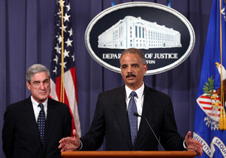3Qs: A deeper analysis of U.S.-Iran relations

Last week, agents from the FBI and Drug Enforcement Administration (DEA) disrupted an alleged plot to commit a “significant terrorist act in the United States” tied to Iran. U.S. government officials stated that the plot included the assassination of Adel Al-Jubeir, the Saudi Arabian ambassador to the United States, as well as subsequent attacks on Saudi and Israeli embassies. Officials claimed that the plot was “conceived” in Iran by a unit of Iran’s Revolutionary Guard Corps, the Quds Force. We asked Kimberly Jones, a faculty associate in Northeastern University’s Middle East Center for Peace, Culture and Development, to explain how these allegations may affect relations among the United States, Iran, Saudi Arabia and the larger global community.
Vice President Joseph Biden has commented that the U.S. government must “unite world opinion” against Iran. How have other nations reacted thus far in response to the allegations? What will be the ultimate response of the global community?
I think Vice President Biden has set a heck of a bar with his comments. There are far more questions than answers about the alleged assassination plot at this point, as there should be. Interestingly (and unsurprisingly) the speculation, especially in the early hours, garnered far more ink than the critical queries. Attention needs to focus on several questions: Why would Iran develop an attack on U.S. soil at this time? Why break common-sense protocols about communication? Why connect with Mexican organized crime, and how could the cartel make a cost/benefit analysis that involving themselves would weigh in their favor?
As one would expect, the international response has been varied. One U.K. statement called the Iranian plot a “major escalation, “ while Russia took the matter “seriously” and China pointed out that it was still an investigation.
As far as the long-term response of the international community — the jury is still out — figuratively and literally. At this point, there has been an indictment, but no one has been found guilty, other than in the court of public opinion.
I do think there are some who are more skeptical of the United States in light of its war with Iran’s neighbor, Iraq, eight years ago. This is a different situation with a different administration, but critics will want to better assess the veracity of the allegations.
What impact will these accusations have on the already-tense relationship between the U.S. and Iran?
The short answer is that time will tell — it depends how things play out. The rhetoric has certainly been ratcheted up, and new U.S. sanctions (against an Iranian airline) are in place. Iran has essentially termed the allegations a fairytale.
What has been the nature of the relationship between Iran and Saudi Arabia historically? Have there been any changes recently that may have been motivation for the alleged plot?
In the last few decades, there has been little love lost between Iran and Saudi Arabia. Some of this is couched in religious rhetoric and realities (Saudi Arabia is Sunni and Iran is Shi’ite). However, at base, the tension between the two nations is about geopolitical positioning and power over a range of issues in the region — support for various groups in the neighborhood, energy and the political repercussions from the “Year of Arab Discontent.”
Iran has a laundry list of real and rhetorical grievances — from Saudi support for Iraq during the Iran-Iraq war, to what it has perceived as Saudi meddling in Lebanon and Syria, to the recent Saudi intervention in Bahrain on behalf of the minority Sunni monarchy against the protesting Shi’a majority.
Many regional observers, myself included, view Iran as a rational actor and are feeling hard-pressed, until more information is available, to see this as a strategic gambit that makes a lot of sense.





